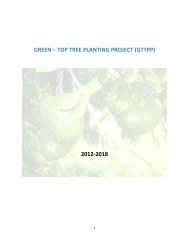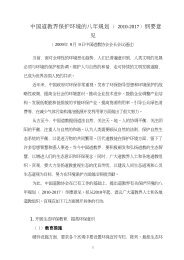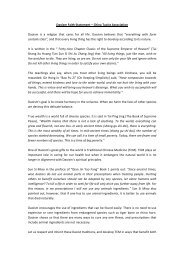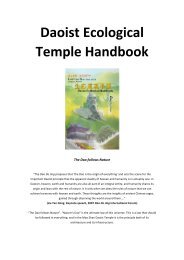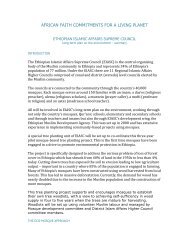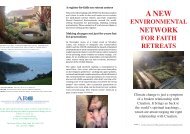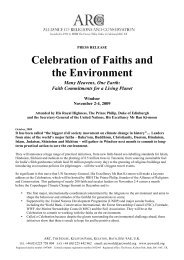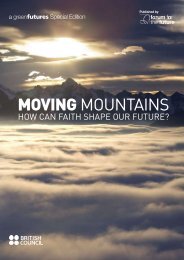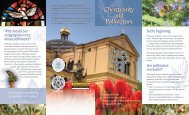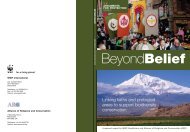summary paper - Alliance of Religions and Conservation
summary paper - Alliance of Religions and Conservation
summary paper - Alliance of Religions and Conservation
You also want an ePaper? Increase the reach of your titles
YUMPU automatically turns print PDFs into web optimized ePapers that Google loves.
2. What would be the best ways to build awareness <strong>and</strong> knowledge <strong>of</strong> best practices in partnership <strong>and</strong><br />
collaboration What would be the best way to advance a productive dialogue on sustainable<br />
development challenges at global <strong>and</strong> national levels<br />
3. In terms <strong>of</strong> operational collaboration, what would be the main opportunities <strong>and</strong> risks involved in<br />
exp<strong>and</strong>ing the use <strong>of</strong> religious institutions <strong>and</strong> entities as channels for funding environment <strong>and</strong> other<br />
interventions What are the principal barriers to be overcome Do you see potential for largescale<br />
programmatic collaboration, or is it more appropriate to develop locally grounded, small scale project<br />
interventions<br />
4. How, if at all, can religious institutions <strong>and</strong> entities become effective agents for strategic policy change<br />
(such as with regard to fiscal reforms that promote environmental stewardship, governance reforms<br />
addressing corruption, rights to information, expansion <strong>of</strong> women’s rights, etc.) What are the limits to<br />
collaboration between development <strong>and</strong> religious actors in taking such agendas forward<br />
SUMMARY OF DISCUSSIONS (summarised by individual group members)<br />
Working group 1<br />
What would be the most useful <strong>and</strong> productive next steps from this conference For example, would it be<br />
worthwhile producing a set <strong>of</strong> shared principles that would guide future collaboration between<br />
development agencies <strong>and</strong> faithbased entities How should this best be done<br />
We proposed 6 steps to move forward:<br />
1) Case studies: Independent, vigorous research <strong>of</strong> existing examples <strong>of</strong> partnerships that already<br />
exist. A wide range – geography, style, religions, areas <strong>of</strong> work <strong>and</strong> scientifically rigorous.<br />
2) Pilot projects: Start up in a few places concrete projects based on the principle that faithbased<br />
organizations can collaborate with governments <strong>and</strong> development agencies.<br />
3) Seminars/conferences <strong>of</strong> a similar type to be held in different regions/countries to continue the<br />
dialogue with more inclusion <strong>of</strong> the South.<br />
4) Faithbased organizations clearly stating their theological reflections on development <strong>and</strong> the<br />
environment <strong>and</strong> being more proactive in presenting our positions.<br />
5) Ask ARC to prepare a database <strong>of</strong> projects <strong>and</strong> organizations working in development <strong>and</strong> the<br />
environment with faithbased organizations.<br />
6) Hold a conference <strong>of</strong> significant leaders: nations, development agencies <strong>and</strong> faith leaders to<br />
prepare a platform/declaration. This must include prominent leaders from stakeholders.<br />
Working group 2<br />
What would be the best ways to build awareness <strong>and</strong> knowledge <strong>of</strong> best practices in partnership <strong>and</strong><br />
collaboration What would be the best way to advance a productive dialogue on sustainable<br />
development challenges at global <strong>and</strong> national levels<br />
(<strong>summary</strong> not received)<br />
Working group 3<br />
In terms <strong>of</strong> operational collaboration, what would be the main opportunities <strong>and</strong> risks involved in<br />
exp<strong>and</strong>ing the use <strong>of</strong> religious institutions <strong>and</strong> entities as channels for funding environment <strong>and</strong> other<br />
interventions What are the principal barriers to be overcome Do you see potential for largescale<br />
programmatic collaboration, or is it more appropriate to develop locally grounded, small scale project<br />
interventions<br />
The group concentrated on environment issues. The potential for partnership might be viewed differently<br />
when looking at other development issues. The group looked at opportunities <strong>and</strong> risks for development<br />
agencies/donors as well as religious groups.<br />
Opportunities for development agencies from partnerships with religious groups were seen as follows:<br />
54



